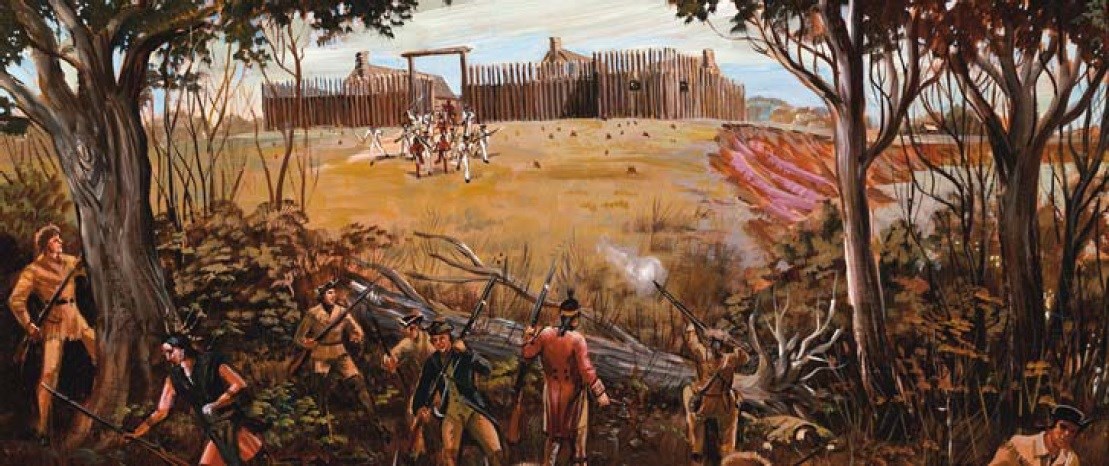Last updated: September 13, 2021
Article
An Account of 'Colbert's Raid'

Arkansas’ Only Revolutionary War Battle
Early in the morning of April 17, 1783, British partisans commanded by James Colbert attacked the settlement at Arkansas Post, and laid siege to the Spanish fort. Ultimately a Spanish victory, Colbert’s Raid is significant as one of the last engagements of the Revolutionary War, and as a battle far removed from the American colonies between European powers.
The account below was written by the Spanish Commander at Arkansas Post to his superiors, recounting the raid:
Since my last letter … Colbert entered this place on the seventeenth of last month, at 2:30 in the morning … at the head of a hundred whites and fourteen Chickasaws took possession of all of the houses, with no obstruction from a party of eight soldiers and a sergeant which forms the garrison of the fort. They [Colbert’s party] seized the Lieutenant Don Luis de Villars with all his …. The four principal men of the settlement with their families got away, escaping to the mountain with six others who were all that made up the village, except the women and children of the hunters. These got away and came to my house, not without danger.
As the first shot was at the Lieutenant’s house, with which they had broken the lock on the door, our garrison ran at once to that place and mixed with them, but as they were superior in numbers to us they killed two soldiers, the one belonging to the hunters and the other a negro of the neighborhood. They seized the Point and five other soldiers. The sergeant got away from three of them who were trying to take him, and ran like a rabbit. Then they made no further movement to kill us when they knew that the sergeant had escaped, and then they took all of the people in the place prisoners and embarrassed us more by taking our cannon.
All of this happened in less than half an hour, when they decided to strike the fort, which due to its bad location one could approach within pistol shot before being seen…
Then we began again a fight which lasted from 3 o’clock in the morning until 9 o’clock, piercing like a sieve the palisades with carbines, but the bullets penetrated no more than an inch, because of the evergreen oak of which the palisades were made. On seeing this, I decided to make a formal blockade with artillery. I decided that before giving them a chance to form a battery, that it would be a good idea to make a great sally…. With the four Arkansas [Quapaw Indians] who were fortunately in this post, this gave me fourteen men in all including Sergeant Alexo Pastor, the man who had just escaped from the hands of the enemy a little while ago. I gave the orders to yell as the Indians do when they attack.
At this time Colbert sent … Dona Marie Luisa Villars, wife of the lieutenant prisoner, carrying a flag of truce accompanied by one of his officials, who was shaking with fright as he drew near the fort. As soon as we saw they were carrying the flag, I ordered all firing to cease. Upon receiving the Senora who presented me a paper which Colbert had written in French, as follows: “M. Le Capitaine Colbert is sent by his superiors to take the post of the Arkansas and by this power Sir, he demands that you capitulate. It is his plan to take it with all his forces, having already taken all the inhabitants, together with the Lieut. Luis de Villars and his family (signed with the red seal April 17, 1783) James Colbert.”
Our sally was not stopped by the white flag, great number of our enemy who upon hearing the shouts and at the same time a volley, retired quickly to the place where they had the camp and the guarded prisoners. As they retreated they said in loud voices, “Let’s go! Let’s go! The Indians are upon us.” Being closely followed by us they left the camp and retreated quickly taking their prisoners with them.
Jacobo du Breuil to Estevan Miro
May 5, 1783
For Further Reading:
Bearrs, Edwin C. Special History Report: The Colbert Raid. Denver: National Park Service, 1974.
Lewis, Anna; translator and editor. “A British Attack on a Spanish Post, 1783,” Arkansas Historical Quarterly 2(1943): 261- 264.
